Book contents
- Seeing Us in Them
- Cambridge Studies in Public Opinion and Political Psychology
- Seeing Us in Them
- Copyright page
- Dedication
- Contents
- Figures
- Tables
- Prologue
- 1 The Puzzle
- 2 Group Empathy Theory
- 3 Measuring Group Empathy
- 4 An Origin Story
- 5 Group Empathy and Homeland Security
- 6 Group Empathy and the Politics of Immigration
- 7 Group Empathy and Foreign Policy
- 8 Group Empathy in the Era of Trump
- 9 Group Empathy, Brexit, and Public Opinion in the United Kingdom
- 10 Cultivating Group Empathy and Challenging Ethnonationalist Politics
- Epilogue Group Empathy in Response to the COVID-19 Pandemic
- References
- Index
- Books in the series
1 - The Puzzle
Empathy for Outgroups amid Existential Threats and Ingroup Interests
Published online by Cambridge University Press: 11 March 2021
- Seeing Us in Them
- Cambridge Studies in Public Opinion and Political Psychology
- Seeing Us in Them
- Copyright page
- Dedication
- Contents
- Figures
- Tables
- Prologue
- 1 The Puzzle
- 2 Group Empathy Theory
- 3 Measuring Group Empathy
- 4 An Origin Story
- 5 Group Empathy and Homeland Security
- 6 Group Empathy and the Politics of Immigration
- 7 Group Empathy and Foreign Policy
- 8 Group Empathy in the Era of Trump
- 9 Group Empathy, Brexit, and Public Opinion in the United Kingdom
- 10 Cultivating Group Empathy and Challenging Ethnonationalist Politics
- Epilogue Group Empathy in Response to the COVID-19 Pandemic
- References
- Index
- Books in the series
Summary
The book opens with a puzzle: What would compel members of one group to stand in solidarity with an outgroup in their fight for justice and equality, even when that act carries great personal risk and material sacrifice? We think a central piece of this puzzle is what we call group empathy: the ability and motivation to take another group’s perspective, feel emotionally connected to their struggles, and care about their welfare even when the individual’s interests, or those of his or her group, are at risk. We continue the discussion of this puzzle in two contemporary threat contexts: terrorism and immigration. Specifically, we ask why African Americans – who perceive a greater risk of terrorism on average – are less willing to support punitive homeland security policies that profile Arabs. Or, why are Latinos more supportive of foreign aid and more welcoming of refugees even if this means greater competition for jobs and social welfare? Once again, we think the answer lies in group empathy. We review the empirical studies used to test our theoretical expectations, followed by an outline of the book that provides a brief summary of each chapter.
Keywords
- Type
- Chapter
- Information
- Seeing Us in ThemSocial Divisions and the Politics of Group Empathy, pp. 6 - 19Publisher: Cambridge University PressPrint publication year: 2021



